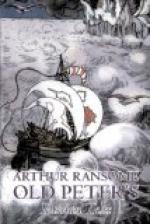Only the shepherd boy, when he heard that the little pretty one was to marry the Tzar, turned sadly away and went off into the forest.
“Are you happy, little sweet pigeon?” says the Tzar.
“Oh yes,” says the Little Stupid, who was now Tzaritza and mother of Holy Russia; “but there is one thing that would make me happier.”
“And what is that?” says the lord Tzar.
“I cannot bear to lose my old father and my little mother and my dear sisters. Let them be with me here in the palace, as they were in my father’s house.”
The Tzar laughed at the little pretty one, but he agreed, and the little pretty one ran to tell them the good news. She said to her sisters, “Let all be forgotten, and all be forgiven, and may the evil eye fall on the one who first speaks of what has been!”
For a long time the Tzar lived, and the little pretty one the Tzaritza, and they had many children, and were very happy together. And ever since then the Tzars of Russia have kept the silver saucer and the transparent apple, so that, whenever they wish, they can see everything that is going on all over Russia. Perhaps even now the Tzar, the little father—God preserve him!—is spinning the apple in the saucer, and looking at us, and thinking it is time that two little pigeons were in bed.
* * * * *
“Is that the end?” said Vanya.
“That is the end,” said old Peter.
“Poor shepherd boy!” said Maroosia.
“I don’t know about that,” said old Peter. “You see, if he had married the little pretty one, and had to have all the family to live with him, he would have had them in a hut like ours instead of in a great palace, and so he would never have had room to get away from them. And now, little pigeons, who is going to be first into bed?”
SADKO.
In Novgorod in the old days there was a young man—just a boy he was—the son of a rich merchant who had lost all his money and died. So Sadko was very poor. He had not a kopeck in the world, except what the people gave him when he played his dulcimer for their dancing. He had blue eyes and curling hair, and he was strong, and would have been merry; but it is dull work playing for other folk to dance, and Sadko dared not dance with any young girl, for he had no money to marry on, and he did not want to be chased away as a beggar. And the young women of Novgorod, they never looked at the handsome Sadko. No; they smiled with their bright eyes at the young men who danced with them, and if they ever spoke to Sadko, it was just to tell him sharply to keep the music going or to play faster.
So Sadko lived alone with his dulcimer, and made do with half a loaf when he could not get a whole, and with crust when he had no crumb. He did not mind so very much what came to him, so long as he could play his dulcimer and walk along the banks of the little[1] river Volkhov that flows by Novgorod, or on the shores of the lake, making music for himself, and seeing the pale mists rise over the water, and dawn or sunset across the shining river.




